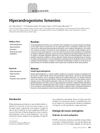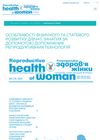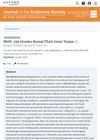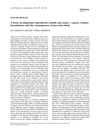 December 2014 in “Endocrinología y nutrición”
December 2014 in “Endocrinología y nutrición” The woman's rare combination of diseases suggests an unknown factor may predispose individuals to multiple endocrine diseases.
 August 2013 in “Fertility and Sterility”
August 2013 in “Fertility and Sterility” High levels of fatty acids are linked to increased androgen production and inflammation in women with PCOS, which may affect IVF outcomes.
 1 citations,
April 2021 in “International Journal of Dermatology”
1 citations,
April 2021 in “International Journal of Dermatology” Women with conditions like PCOS may have a higher risk of COVID-19, but treatments like isotretinoin could help those with acne.
 9 citations,
January 2022 in “Reproductive Biology and Endocrinology”
9 citations,
January 2022 in “Reproductive Biology and Endocrinology” High levels of male hormones and irregular periods best predict how well PCOS patients will respond to metformin treatment.
 6 citations,
August 2013 in “Fertility and Sterility”
6 citations,
August 2013 in “Fertility and Sterility” Eating cream can increase ovarian androgen production in women with Polycystic Ovary Syndrome, which is not related to obesity.
 October 2020 in “Medicine - Programa De Formación Médica Continuada Acreditado”
October 2020 in “Medicine - Programa De Formación Médica Continuada Acreditado” Female hyperandrogenism is a condition caused by too much male hormones, leading to skin issues and ovulation problems, often due to Polycystic Ovary Syndrome, and is treated based on individual symptoms.
 12 citations,
January 2009 in “Gynecological Endocrinology”
12 citations,
January 2009 in “Gynecological Endocrinology” A postmenopausal woman's hair loss and excess hair growth improved after surgery for ovarian hyperthecosis.
 9 citations,
November 2013 in “Presse Medicale”
9 citations,
November 2013 in “Presse Medicale” The document concludes that managing female hyperandrogenism requires a combination of identifying the cause, lifestyle changes, medication, and cosmetic treatments.
April 2019 in “Journal of the Endocrine Society” A woman's severe insulin resistance improved with treatment, but she still had high testosterone levels due to ovarian issues.
January 2020 in “International Journal of Trichology” Androgen-producing ovarian tumors can cause male-pattern hair loss in women.
 57 citations,
October 2013 in “international journal of endocrinology and metabolism”
57 citations,
October 2013 in “international journal of endocrinology and metabolism” Female pattern hair loss is common, linked to polycystic ovarian syndrome, and treated with topical Minoxidil.
 4809 citations,
January 2004 in “Fertility and Sterility”
4809 citations,
January 2004 in “Fertility and Sterility” The 2003 consensus updated PCOS diagnosis criteria and highlighted increased risks of diabetes and heart disease for those affected.
 34 citations,
January 2011 in “Fundamental & Clinical Pharmacology”
34 citations,
January 2011 in “Fundamental & Clinical Pharmacology” New treatments for PCOS show promise, but no current medication treats all aspects of the condition.
28 citations,
January 2017 in “Obstetrician & gynaecologist/The obstetrician & gynaecologist” The document concludes that managing PCOS effectively requires considering ethnic differences, obesity's impact, and ethical concerns in treatment approaches.
26 citations,
July 2021 in “International journal of adolescent medicine and health” New treatments for PCOS are improving fertility and managing symptoms better.
 10 citations,
June 2006 in “Fertility and Sterility”
10 citations,
June 2006 in “Fertility and Sterility” The conclusion is that metformin is a first-line treatment for PCOS, particularly for restoring ovulation and increasing pregnancy rates, with other treatments depending on specific symptoms.
 5 citations,
March 2015 in “Women's Health”
5 citations,
March 2015 in “Women's Health” The document concludes that diagnosing PCOS requires a thorough approach, considering various symptoms and risks, and calls for improved methods to identify PCOS types and prevent diabetes.
 2 citations,
March 2016 in “InnovAiT”
2 citations,
March 2016 in “InnovAiT” PCOS is a common hormonal disorder in women, often involving menstrual issues and increased diabetes risk, managed through lifestyle changes and targeted treatments.
 2 citations,
August 2011 in “Revista Medica De Chile”
2 citations,
August 2011 in “Revista Medica De Chile” A postmenopausal woman's high testosterone levels and symptoms improved after removing a tumor from her ovary.
 1 citations,
May 2022 in “Research Square (Research Square)”
1 citations,
May 2022 in “Research Square (Research Square)” Acetate helps reduce depression in rats with PCOS by lowering specific gene expression and DNA changes in the brain.
 1 citations,
January 2022 in “IntechOpen eBooks”
1 citations,
January 2022 in “IntechOpen eBooks” Different PCOS types respond uniquely to infertility treatments, with some having lower pregnancy rates and higher risks of complications.
 July 2024 in “Reproductive health of woman”
July 2024 in “Reproductive health of woman” Girls conceived via assisted reproductive technologies show early puberty signs and larger ovaries.
 July 2022 in “International journal of medical science and clinical invention”
July 2022 in “International journal of medical science and clinical invention” Women with irregular periods should be checked for PCOS and treated early to prevent complications, with birth control pills helping to manage symptoms.
 April 2019 in “Journal of the Endocrine Society”
April 2019 in “Journal of the Endocrine Society” A woman's severe male-like symptoms were caused by a rare, benign tumor in her ovary that produced male hormones.
 February 2018 in “InTech eBooks”
February 2018 in “InTech eBooks” Diagnosing and treating PCOS is complex due to differing criteria and requires a team approach.
January 2013 in “Obstetrical & gynecological survey” Most women with hirsutism have normal hormone levels and can be treated with cosmetic methods; obesity and PCOS are common causes, and treatments depend on the underlying issue.
 February 2010 in “Acta Obstetricia et Gynecologica Scandinavica”
February 2010 in “Acta Obstetricia et Gynecologica Scandinavica” The issue covers reproductive health topics like cancer markers, incontinence treatments, and the impact of pre-term birth.
January 2005 in “Elsevier eBooks” Insulin resistance and hyperinsulinism are linked to fertility issues and can worsen symptoms of PCOS.
 97 citations,
February 2007 in “Clinical Obstetrics and Gynecology”
97 citations,
February 2007 in “Clinical Obstetrics and Gynecology” The definition of Polycystic Ovary Syndrome may change with new research, and careful screening is key for managing the condition.
 62 citations,
April 2016 in “Best Practice & Research in Clinical Obstetrics & Gynaecology”
62 citations,
April 2016 in “Best Practice & Research in Clinical Obstetrics & Gynaecology” The conclusion is that there's a need for a new conference to establish stricter guidelines for diagnosing Polycystic Ovary Syndrome (PCOS).
























